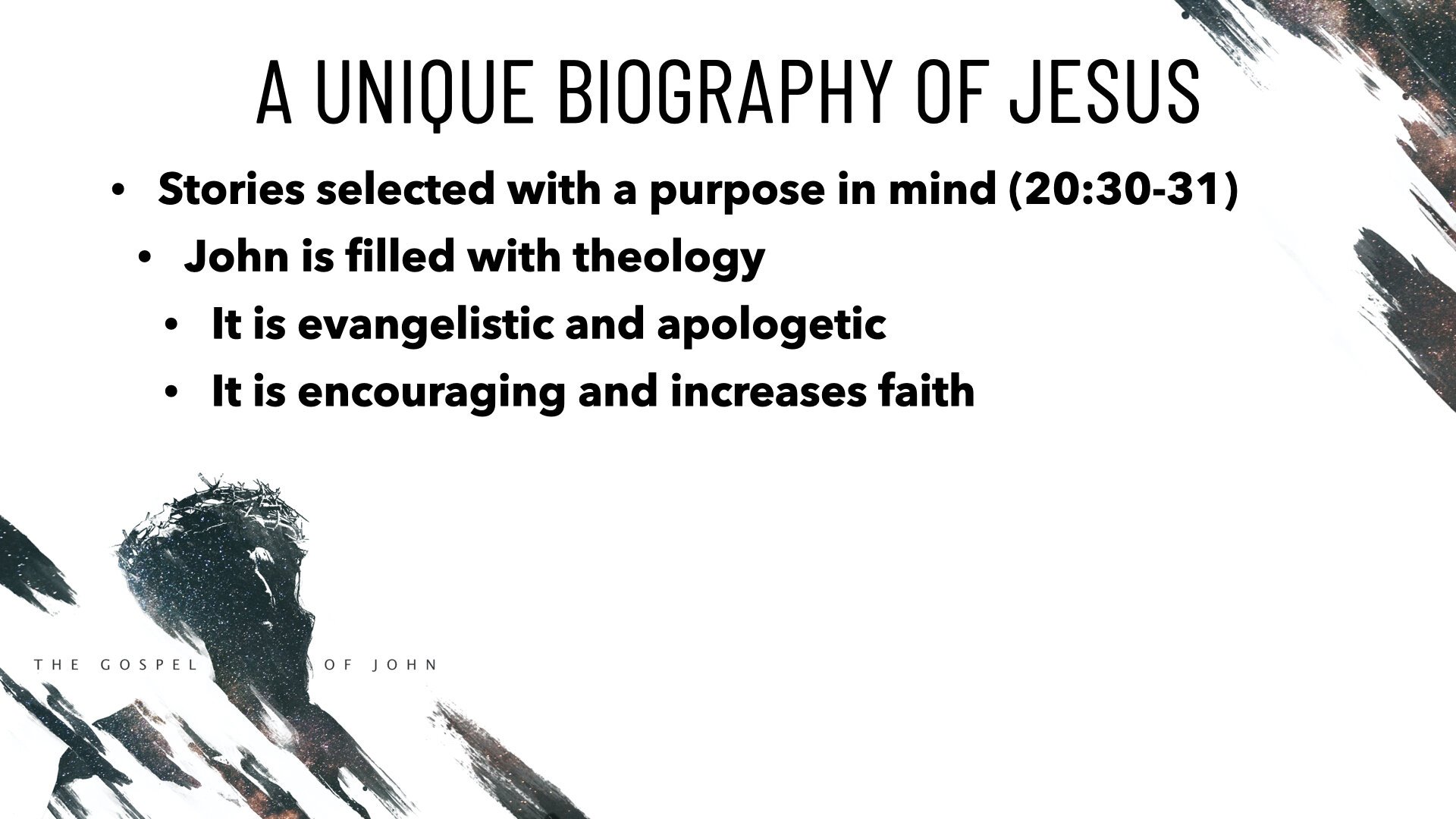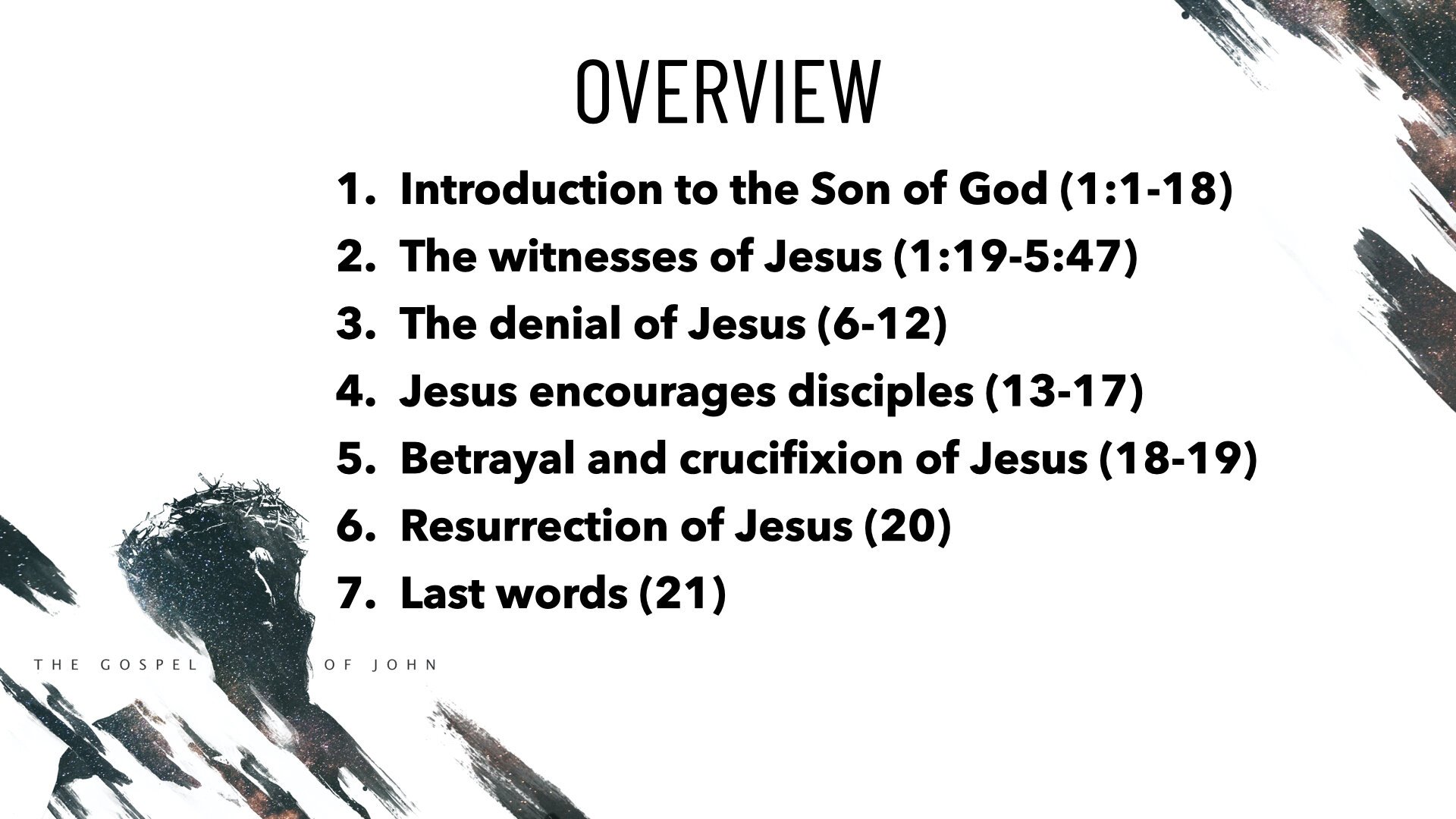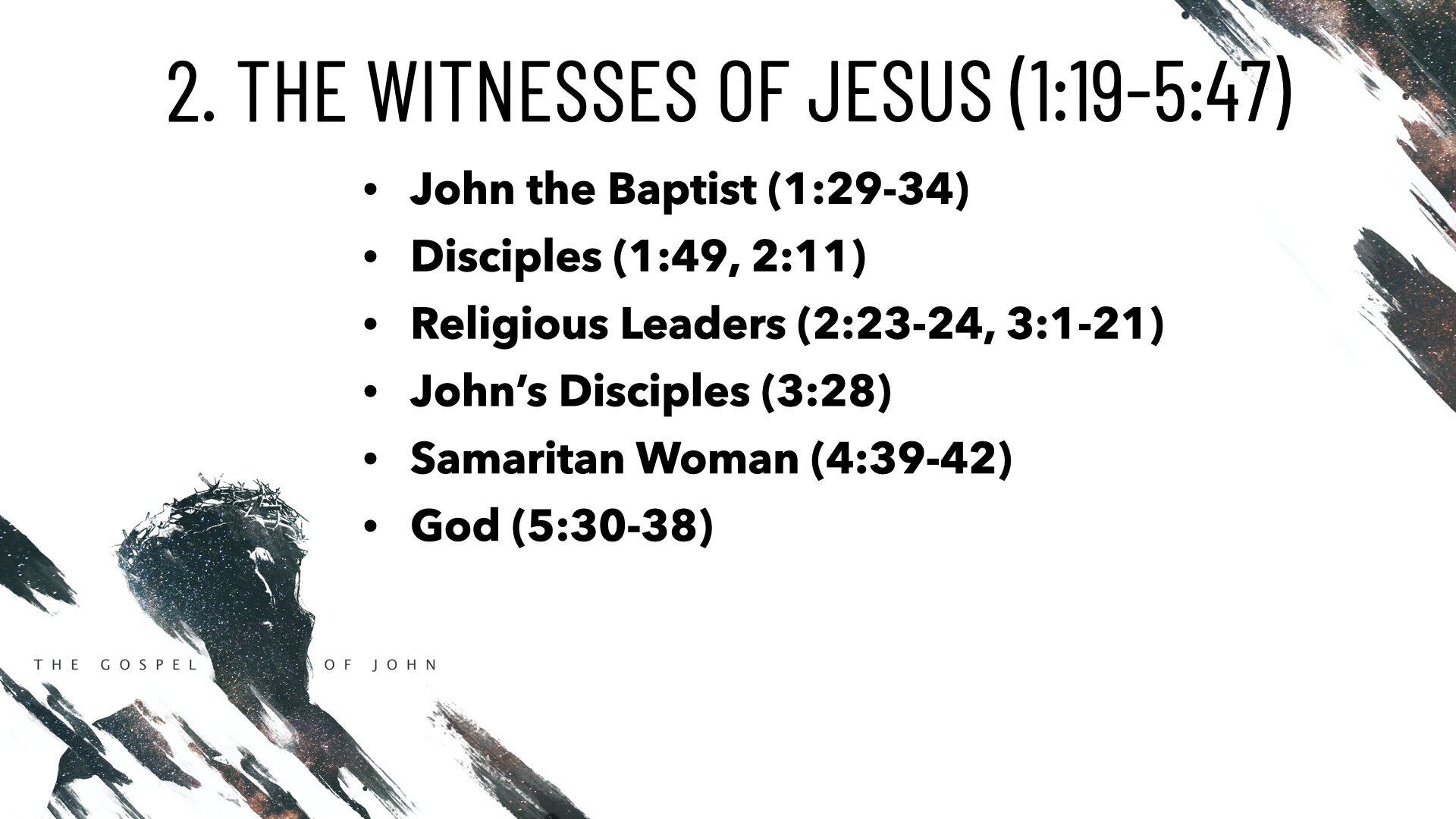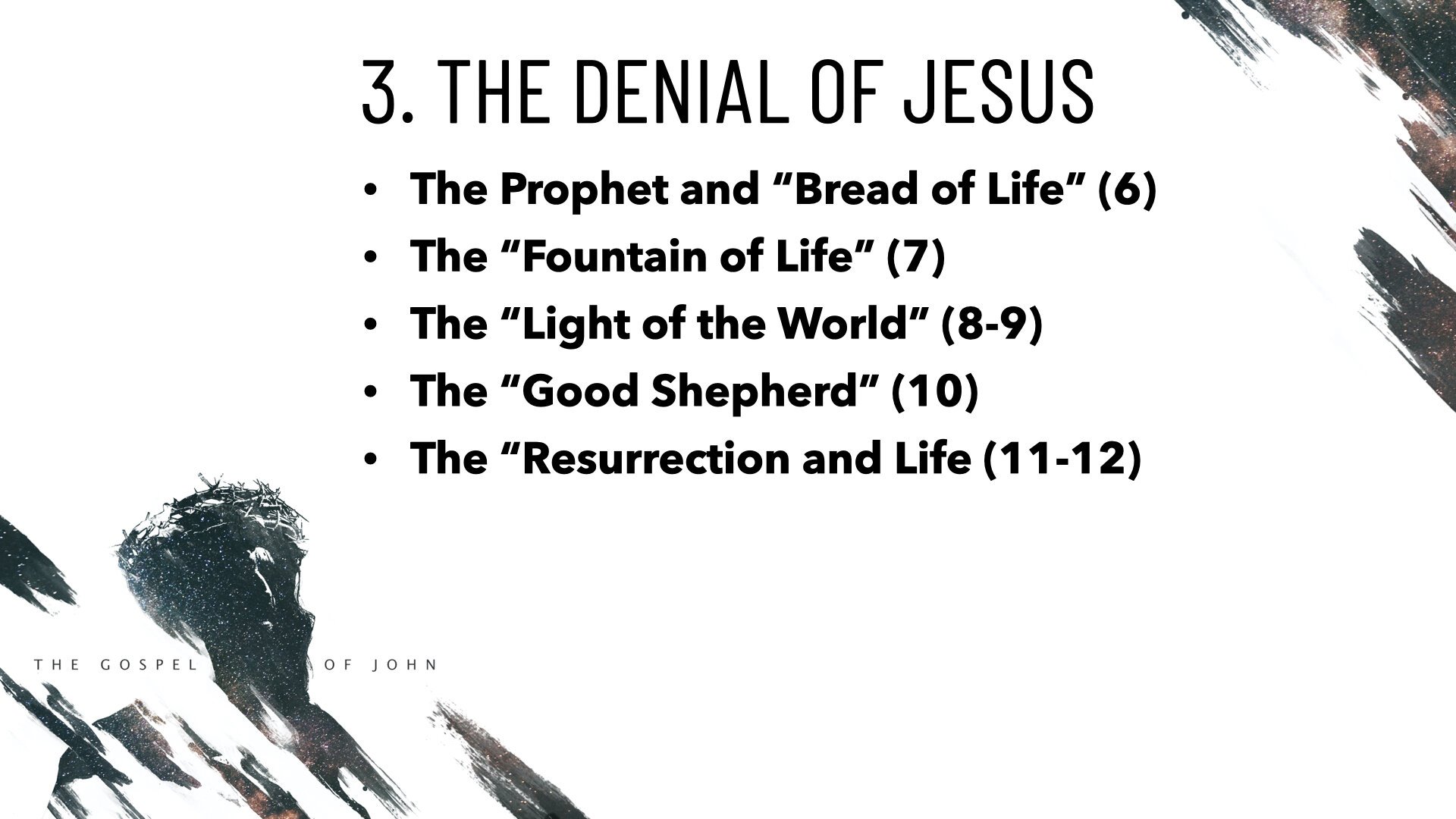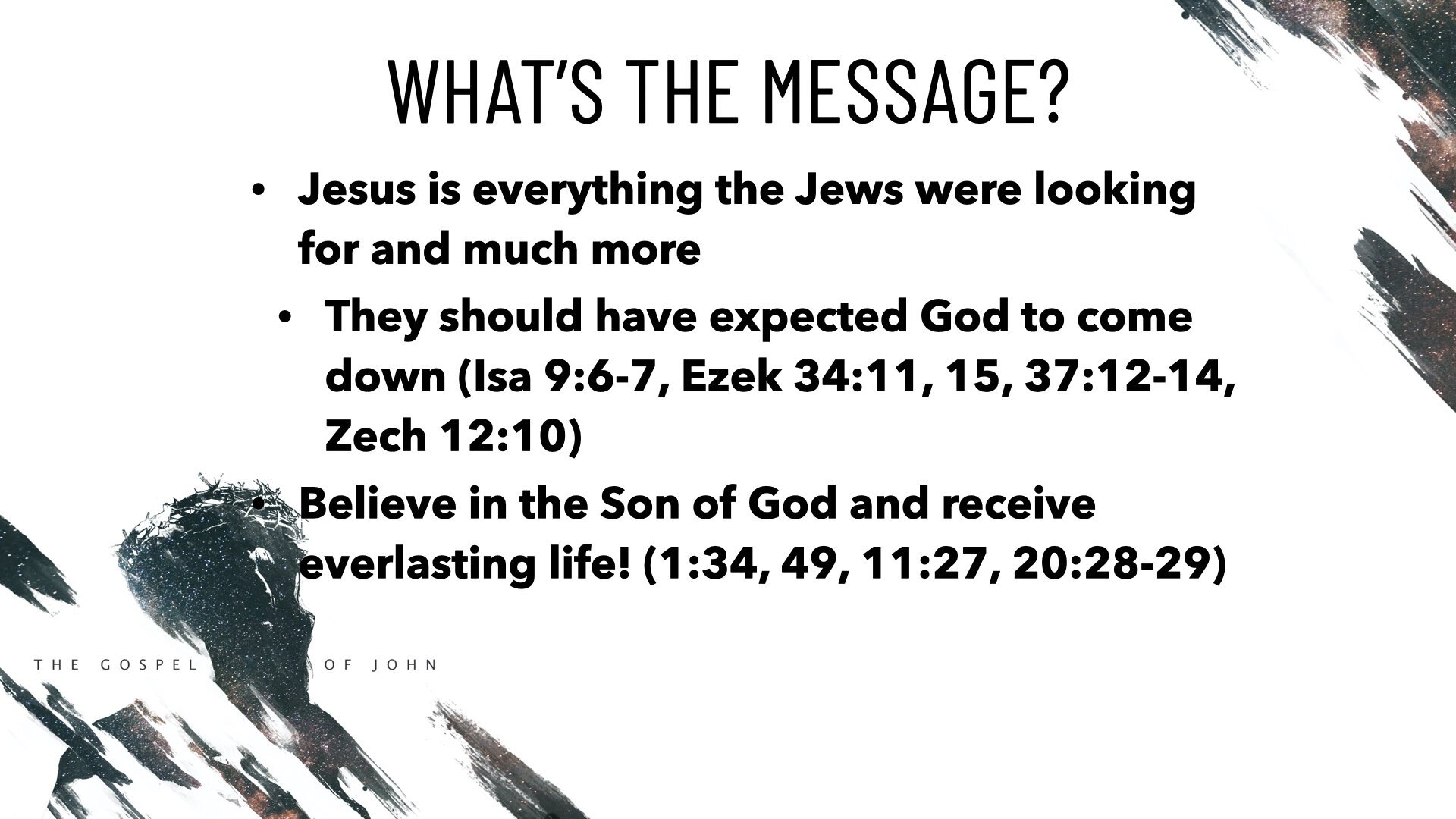That You May Believe (John)
This evening, we will begin overviewing books of the New Testament. To start us off, I chose the most difficult of the gospels. There are four gospels or biographies of Jesus. The first three have several similarities, and they summarize Jesus' life. But when you read through John's book, you will notice that he writes with a different purpose in mind. Most of the stories you find in this gospel are not found in the other three gospels. He tells you stories that seem unrelated to other stories and details that seem irrelevant. But he has a purpose behind it all. That purpose is alluded to in the first eighteen verses, but it is clearly stated in Chapter 20.
John 20:30--31 (ESV) --- 30 Now Jesus did many other signs in the presence of the disciples, which are not written in this book; 31 but these are written so that you may believe that Jesus is the Christ, the Son of God, and that by believing you may have life in his name.
Here we see that John is writing this so that people may believe that Jesus is the Son of God. This is just a small portion of all the things John could have told us, but he primarily selected these stories and dialogues so that we could read them and believe in Jesus as the one and only Son of God. That makes this book both evangelistic and extremely encouraging for those with doubt. It is a theology book and an apologetic book. That's what makes this a difficult book to read and fully understand.
Don't get me wrong. This book is excellent for people of all ages and understanding levels, but it is endlessly deep. The first 18 verses could take multiple hours to digest fully.
Overview
From a high level, the book can be divided into seven sections.
1. Introduction to the Son of God (1:1-18)
2. The witnesses of Jesus (1:19-5:47)
3. Jews Deny Jesus (6-12)
4. Jesus Encourages Disciples (13-17)
5. Betrayal and Crucifixion of Jesus (18-19)
6. Resurrection of Jesus (20)
7. Last Words (21)
Introduction to the Son of God (1:1-18)
John 1:1--18 (ESV) --- 1 In the beginning was the Word, and the Word was with God, and the Word was God. 2 He was in the beginning with God. 3 All things were made through him, and without him was not anything made that was made. 4 In him was life, and the life was the light of men. 5 The light shines in the darkness, and the darkness has not overcome it. 6 There was a man sent from God, whose name was John. 7 He came as a witness, to bear witness about the light, that all might believe through him. 8 He was not the light, but came to bear witness about the light. 9 The true light, which gives light to everyone, was coming into the world. 10 He was in the world, and the world was made through him, yet the world did not know him. 11 He came to his own, and his own people did not receive him. 12 But to all who did receive him, who believed in his name, he gave the right to become children of God, 13 who were born, not of blood nor of the will of the flesh nor of the will of man, but of God. 14 And the Word became flesh and dwelt among us, and we have seen his glory, glory as of the only Son from the Father, full of grace and truth. 15 (John bore witness about him, and cried out, "This was he of whom I said, 'He who comes after me ranks before me, because he was before me.'") 16 For from his fullness we have all received, grace upon grace. 17 For the law was given through Moses; grace and truth came through Jesus Christ. 18 No one has ever seen God; the only God, who is at the Father's side, he has made him known.
Do we see how this alludes to Jesus being the Son of God? Jesus is called the Word of God. He was at the beginning with God, and he was a part of creation. John makes some very bold claims about Jesus from the beginning of this gospel. Why? Because he wants to set everything up. But these ideas are profound. One phrase is going to be important as we study the book of John.
John 1:7--8 (ESV) --- 7 He came as a witness, to bear witness about the light, that all might believe through him. 8 He was not the light, but came to bear witness about the light.
John 1:15 (ESV) --- 15 (John bore witness about him, and cried out, "This was he of whom I said, 'He who comes after me ranks before me, because he was before me.'")
John 1:18 (ESV) --- 18 No one has ever seen God; the only God, who is at the Father's side, he has made him known.
Notice the repeated idea that John the Baptist bore witness to Jesus' deity. Then, notice the idea that Jesus has bore witness to the nature of God because he was with God. From a high level, that's what this book is about. John wants us to see the evidence of Jesus' deity. Then, he wants us to understand how God is revealed through Jesus.
John 17:20--23 (ESV) --- 20 "I do not ask for these only, but also for those who will believe in me through their word, 21 that they may all be one, just as you, Father, are in me, and I in you, that they also may be in us, so that the world may believe that you have sent me. 22 The glory that you have given me I have given to them, that they may be one even as we are one, 23 I in them and you in me, that they may become perfectly one, so that the world may know that you sent me and loved them even as you loved me.
This section sets the stage by discussing many themes in the book. Bearing witness is a theme. But many other themes are started in this text. Jesus providing light and life is a repeated theme throughout the book. Being born again by the will of God is a theme. The world did not know him is a theme (1:10).
Witnesses of Jesus (1:19-5:47)
John the Baptist
The next section begins to give us some detailed evidence of Jesus' deity. It starts with the testimony of John, who confessed that he was not the Christ. He was sent to prepare the way for Christ. Then John plainly states before his disciples that Jesus is the Son of God.
John 1:29--34 (ESV) --- 29 The next day he saw Jesus coming toward him, and said, “Behold, the Lamb of God, who takes away the sin of the world! 30 This is he of whom I said, ‘After me comes a man who ranks before me, because he was before me.’ 31 I myself did not know him, but for this purpose I came baptizing with water, that he might be revealed to Israel.” 32 And John bore witness: “I saw the Spirit descend from heaven like a dove, and it remained on him. 33 I myself did not know him, but he who sent me to baptize with water said to me, ‘He on whom you see the Spirit descend and remain, this is he who baptizes with the Holy Spirit.’ 34 And I have seen and have borne witness that this is the Son of God.”
Disciples
After this, we see from verse 35 through 2:11 that he revealed himself to his disciples through the book's first "sign." Jesus turns water into wine. Now all of the miracles in this book are intended to represent a bigger idea. I don't have enough time to dive into all of the meanings, but the first sign shows how Jesus is turning the religious ritualism of his day into a time of great feasting and rejoicing. Jesus turned the ritual water into a ton of outstanding wine.
Religious Leaders
After doing this, Jesus goes into the temple and condemns them for making the temple into a market. Once again, he changes the traditions of men to something meaningful and right. This shows his willingness to go against the grain for God to be glorified. You will see him do that a lot throughout this book. After he turns over the temple tables, many believe in him but listen to what John says.
John 2:23--25 (ESV) --- 23 Now when he was in Jerusalem at the Passover Feast, many believed in his name when they saw the signs that he was doing. 24 But Jesus on his part did not entrust himself to them, because he knew all people 25 and needed no one to bear witness about man, for he himself knew what was in man.
John doesn't want to rely on the testimony of man. Men can be deceived or corrupted. He wants to reveal a more remarkable testimony.
Chapter 3 shows us a Pharisee coming to Jesus, named Nicodemus. Jesus tells him that he has seen and knows the way into the kingdom of God. But Nicodemus must be born again. He must become like a child again and trust God to deliver a new way for salvation. He must step into the light, letting all his deeds be exposed and give up on the dark ways of his past.
John's Disciples
Then, in verse 22, we see John the Baptist confronted by his disciples. They are upset because Jesus is becoming more popular than John.
John 3:28--30 (ESV) --- 28 You yourselves bear me witness, that I said, 'I am not the Christ, but I have been sent before him.' 29 The one who has the bride is the bridegroom. The friend of the bridegroom, who stands and hears him, rejoices greatly at the bridegroom's voice. Therefore this joy of mine is now complete. 30 He must increase, but I must decrease."
We see in John the right attitude and the greatness of humility. His disciples must bear witness that he is not the Christ, and that he said Jesus is.
John 3:31--36 (ESV) --- 31 He who comes from above is above all. He who is of the earth belongs to the earth and speaks in an earthly way. He who comes from heaven is above all. 32 He bears witness to what he has seen and heard, yet no one receives his testimony. 33 Whoever receives his testimony sets his seal to this, that God is true. 34 For he whom God has sent utters the words of God, for he gives the Spirit without measure. 35 The Father loves the Son and has given all things into his hand. 36 Whoever believes in the Son has eternal life; whoever does not obey the Son shall not see life, but the wrath of God remains on him.
All would have well-accepted John the Baptist as a prophet. His testimony means more than the testimony of men who jump from one opinion to another, and he says that Jesus has come to tell us how to obtain eternal life through the pouring out of the Spirit.
Samaritan Woman
In Chapter 4, Jesus speaks to a woman from Samaria at a well. The Jews and Samaritans would typically hate one another. But Jesus speaks to the woman. He helps her see who he is by telling her intimate details of her past. Then, this woman goes and bears witness to Jesus in Samaria.
John 4:39--42 (ESV) --- 39 Many Samaritans from that town believed in him because of the woman's testimony, "He told me all that I ever did." 40 So when the Samaritans came to him, they asked him to stay with them, and he stayed there two days. 41 And many more believed because of his word. 42 They said to the woman, "It is no longer because of what you said that we believe, for we have heard for ourselves, and we know that this is indeed the Savior of the world."
Healings
In the rest of Chapter 4 and Chapter 5, we see Jesus start to heal people. He heals a Roman official's son, and he heals a man who was unable to walk for 38 years! That is a fantastic miracle. He tells the man to pick up his bed and walk, but the Jews were mad about that because it was a Sabbath day. Now, we come across a critical piece of information in this book.
John 5:16--18 (ESV) --- 16 And this was why the Jews were persecuting Jesus, because he was doing these things on the Sabbath. 17 But Jesus answered them, "My Father is working until now, and I am working." 18 This was why the Jews were seeking all the more to kill him, because not only was he breaking the Sabbath, but he was even calling God his own Father, making himself equal with God.
The Jews want to kill Jesus for doing work, not the Sabbath, but even more so for claiming that God was his Father. They don't believe he is the Son of God. This begins a transition into another part of the book. In Chapters 1-5, John shares stories about those who bear witness to Jesus being the Son of God. In Chapters 6-12, we read about the Jews refusing to believe in Jesus.
John 5:30--38 (ESV) --- 30 "I can do nothing on my own. As I hear, I judge, and my judgment is just, because I seek not my own will but the will of him who sent me. 31 If I alone bear witness about myself, my testimony is not true. 32 There is another who bears witness about me, and I know that the testimony that he bears about me is true. 33 You sent to John, and he has borne witness to the truth. 34 Not that the testimony that I receive is from man, but I say these things so that you may be saved. 35 He was a burning and shining lamp, and you were willing to rejoice for a while in his light. 36 But the testimony that I have is greater than that of John. For the works that the Father has given me to accomplish, the very works that I am doing, bear witness about me that the Father has sent me. 37 And the Father who sent me has himself borne witness about me. His voice you have never heard, his form you have never seen, 38 and you do not have his word abiding in you, for you do not believe the one whom he has sent.Do you see the importance of this text in understanding John's purpose? Jesus says that God bears witness about him, that he is the Son of God. If Jesus were blaspheming, he would have no power to do anything. God would not help him. But the Jews don't want to believe.
The Jews Refuse
The Jews believe that they are following Moses, but Moses speaks about Jesus. In Chapter 6, John shows us two signs of Jesus that reveal he is greater than Moses.
The Prophet and Bread of Life
First, we see Jesus provide food like Moses, but he does it by hand. The people see this sign and know that he is the Prophet foretold in Deuteronomy. They want to make him king. But Jesus didn't want to be a king like they have in mind.
The second sign is Jesus walking on water. He doesn't part the sea. He walks over the stormy sea and somehow moves a boat immediately to land.
These signs show him to be greater than Moses. In the rest of Chapter 6, the crowds try to follow Jesus, but they are too focused on earthly things. They want Jesus to be an earthly king that will give them what they want. They don't want to submit to the rule of God. So Jesus tells them that he is the bread of life. They must eat his flesh and drink his blood to have eternal life.
They don't like this. They don't understand that they must seek to understand Jesus' teachings and how to receive the kingdom's blessings. Instead of trying to understand what Jesus means, they are grossed out at the idea of cannibalism. But his disciples know that he is the Son of God, except Judas.
Fountain of Life
Chapter 7 shows Jesus going to a feast. Again he finds opposition. Some say they know that Jesus comes from Nazareth, so he can't be the one. Others say, "When the Christ appears, will he do more signs that this man has done?"
On the last day of the feast, he stands up and tells everyone to come to him and drink. This is another bizarre image, but those who come to him and drink will become a well of living waters.
Light of the World
Chapter 8 begins with Jesus forgiving a woman caught in the act of adultery and commanding her never to do it again.
John 8:12--18 (ESV) --- 12 Again Jesus spoke to them, saying, "I am the light of the world. Whoever follows me will not walk in darkness, but will have the light of life." 13 So the Pharisees said to him, "You are bearing witness about yourself; your testimony is not true." 14 Jesus answered, "Even if I do bear witness about myself, my testimony is true, for I know where I came from and where I am going, but you do not know where I come from or where I am going. 15 You judge according to the flesh; I judge no one. 16 Yet even if I do judge, my judgment is true, for it is not I alone who judge, but I and the Father who sent me. 17 In your Law it is written that the testimony of two people is true. 18 I am the one who bears witness about myself, and the Father who sent me bears witness about me."
Now we see the picture of Jesus being the light of the world. But he tells them that he only needs the works of God to bear witness that he is the Son of God. Then, he condemns the Jews for having an earthly focus, and he claims to be greater than Abraham.
Chapter 9 continues this idea of Jesus being the light of the world by healing the eyes of a man born blind. But the Jews put that man out of the synagogue because they refuse to believe that Jesus is from God.
The Good Shepherd
Chapter 10 uses the image of Jesus as a good shepherd. Then he is accused by the Jews of having a demon, and he says something that makes the Jews want to kill him.
John 10:30 (ESV) --- 30 I and the Father are one."
The Jews think that he is blaspheming. Listen to Jesus' response
John 10:34--38 (ESV) --- 34 Jesus answered them, "Is it not written in your Law, 'I said, you are gods'? 35 If he called them gods to whom the word of God came---and Scripture cannot be broken--- 36 do you say of him whom the Father consecrated and sent into the world, 'You are blaspheming,' because I said, 'I am the Son of God'? 37 If I am not doing the works of my Father, then do not believe me; 38 but if I do them, even though you do not believe me, believe the works, that you may know and understand that the Father is in me and I am in the Father."
The Resurrection and Life
In Chapter 11, Jesus waits four days before healing Lazarus, and again the Jews want to kill him. In Chapter 12, we get to the climax of this section, where Jesus returns to Jerusalem six days before Passover, and all the crowds are starting to believe in him because he raised Lazarus. So the Jews decide to kill Lazarus and Jesus.
John 12:46--48 (ESV) --- 46 I have come into the world as light, so that whoever believes in me may not remain in darkness. 47 If anyone hears my words and does not keep them, I do not judge him; for I did not come to judge the world but to save the world. 48 The one who rejects me and does not receive my words has a judge; the word that I have spoken will judge him on the last day.
These are the last words of Jesus to the crowds in John's gospel, concluding the first half of the book. Now, all that is left is Jesus' intimate conversation with his disciples and the death and resurrection.
Jesus and His Disciples
Chapters 13-17 are some of the most amazing in all the Bible. In this chapter, we learn the final teachings of Jesus before he is carried off to be crucified. No other gospel account comes close to the detail given by John.
In Chapter 13, we learn that Jesus washed his disciples' feet. He also tells some of the disciples that Judas will betray him.
In Chapter 14, the disciples are upset because Jesus tells them he is about to leave them, and they don't understand where he is going or what he is about to do. So Jesus offers them words of comfort. He tells them that he must go to send them the Holy Spirit who will guide the disciples into all truth. They can't understand everything until he does what he is about to do. Chapters 15 and 16 continue with encouragement and promises of things becoming more clear in the future.
John 16:32--33 (ESV) --- 32 Behold, the hour is coming, indeed it has come, when you will be scattered, each to his own home, and will leave me alone. Yet I am not alone, for the Father is with me. 33 I have said these things to you, that in me you may have peace. In the world you will have tribulation. But take heart; I have overcome the world."
After these last words to his disciples, he leads them in a prayer asking God to be with them and to be with all who listen to their teachings.
Betrayal and Crucifixion
Chapters 18 and 19 tell us how Jesus dies. John tells us some details of Jesus' trial that only an insider could give. After Jesus is dead, we see Nicodemus and a man named Joseph of Arimathea take Jesus down from the cross and bury him in a new tomb. Maybe these men bore witness to the details of the trial.
In the crucifixion of Jesus, there are several references to the Old Testament as John tries to point out Jesus' fulfillment of scripture in his death. Again, all of this points to Jesus as the true Son of God he claims to be.
Resurrection
Chapter 20 details the resurrection and how the disciples were hesitant to believe that Jesus could be alive.
Last words
The book then ends with a story about Jesus encouraging Peter, who had denied him three times. He tells Peter to shepherd his sheep. Then, he foretells Peter's death and the long life of John.
What is the Message?
John's gospel is full of descriptions of Jesus. Jesus is the lamb of God, the bread of life, the way, the truth, the life, the fountain of life, the light of the world, etc. The list goes on and on, but John wrote all of these signs so that all may believe that he is the Son of God.
If you have not confessed that belief publicly, I want you to notice how many times people make that confession in the book.
John the Baptist
John 1:34 (ESV) --- 34 And I have seen and have borne witness that this is the Son of God."
Nathaniel
John 1:49 (ESV) --- 49 Nathanael answered him, "Rabbi, you are the Son of God! You are the King of Israel!"
Martha
John 11:27 (ESV) --- 27 She said to him, "Yes, Lord; I believe that you are the Christ, the Son of God, who is coming into the world."
Thomas
John 20:28--29 (ESV) --- 28 Thomas answered him, "My Lord and my God!" 29 Jesus said to him, "Have you believed because you have seen me? Blessed are those who have not seen and yet have believed."
Application
What about you? Are you ready to confess your faith in Jesus? We must all come out of the darkness and believe in Jesus. This phrase gets tossed around a lot, but it points to total submission to Jesus' rule. He has to shine his light into your life and reveal all the sins. We have to stop sinning and make eternal life and satisfaction in Christ, our top priority.


